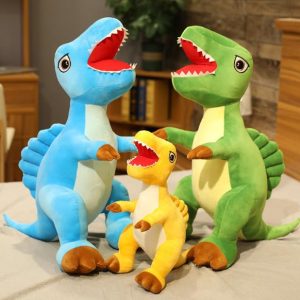1. Alphabet and Number Soft Toys: Soft toys designed as letters and numbers can help young children learn the alphabet and counting. They often come in bright colors and different textures to make learning fun and interactive.
2. Shape and Color Sorting Toys: Soft toys that come in different shapes and colors can help children learn about shapes and colors while also developing their fine motor skills and hand-eye coordination.
3. Puzzles and Matching Games: Soft toys that can be taken apart and put back together or those that require matching pieces can help improve problem-solving skills and cognitive development.
4. Plush Books: Plush books combine the softness of a toy with the educational content of a book. They often have interactive features like flaps, textures, and sounds, enhancing early literacy skills.
5. Stacking and Nesting Toys: Soft toys that can be stacked or nested help children learn about size, spatial relationships, and hand-eye coordination.
6. Role-Play Soft Toys: Soft toys designed as different professions (e.g., doctor, chef, firefighter) can encourage imaginative play and foster social and emotional development.
7. Animal and Wildlife Soft Toys: Soft toys representing various animals and wildlife can be used to introduce children to different species, their habitats, and characteristics.
8. Geography and Map Soft Toys: Soft toys designed as maps or globes can introduce children to geography and different countries, promoting early knowledge about the world.
9. Time-Telling Toys: Soft toys that teach time-telling concepts can be beneficial for children learning to tell time on analog clocks.
10. Language Learning Soft Toys: Some soft toys are designed to teach basic words and phrases in different languages, fostering early language learning and multicultural awareness.
11. Musical Soft Toys: Soft toys with built-in musical features can introduce children to sounds, rhythms, and musical concepts.
12. Science and Nature Soft Toys: Soft toys that represent plants, insects, or other natural elements can be used to teach children about nature and basic science concepts.
Educational soft toys can be valuable tools for parents, caregivers, and educators to support a child’s learning and development in a playful and enjoyable manner. They create a positive learning experience that encourages children to explore, discover, and grow while having fun with their soft and huggable companions.








